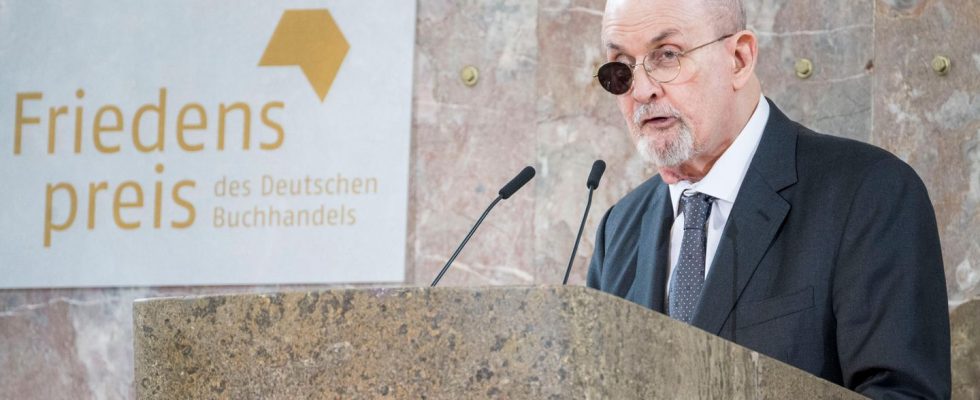Hunted in Iran, celebrated by the West: Author Salman Rushdie receives the German book trade’s Peace Prize. He uses the opportunity to make an appeal.
At the award ceremony for the German book trade’s Peace Prize, the writer Salman Rushdie called for the unconditional defense of freedom of expression. “We live in a time that I never thought I would have to experience,” said the 76-year-old on Sunday in his acceptance speech in Frankfurt’s Paulskirche: “a time in which freedom – especially freedom of expression, without that “If the world of books didn’t exist – it is attacked on all sides by reactionary, authoritarian, populist, demagogic, half-educated, narcissistic and careless voices”.
What can be done to defend freedom of expression, the British-Indian author asked rhetorically in his combative and poetic speech: “counter bad speech with better speech, counter false narratives with better ones, respond to hate with love and do not give up hope, that the truth can prevail even in a time of lies”. By the way, freedom of expression must also be defended “if it offends us, otherwise we would not defend freedom of expression at all.”
Salman Rushdie “one of the most passionate defenders of freedom”
The prize is endowed with 25,000 euros and is considered one of the most important literary awards in the country. Honored are people who have contributed to the realization of the idea of peace. Rushdie received the award “for his indomitability and his affirmation of life,” as the certificate states. He is “one of the most passionate advocates of freedom of thought and language” – and he does so at great personal risk. The head of the German Book Trade Association, Karin Schmidt-Friderichs, called Rushdie in St. Paul’s Church “a person from whom we can learn what courage is.”
Rushdie became famous with his 1981 masterpiece “Midnight Children.” In 1989, the then Iranian revolutionary leader Ayatollah Khomeini called for the author’s murder because of the novel “The Satanic Verses.” For more than ten years he lived hidden in different locations under constant surveillance. Rushdie barely survived a knife attack in the USA in 2022 and has been blind in one eye ever since.
“Here we are gathered to talk about peace when there is a war raging not far away,” said Rushdie. The war in Russia was due to “the tyranny of one man and his greed for power and conquest.” “Another bitter conflict has exploded” in Israel and the Gaza Strip. At the moment, peace seems to him “like a fantasy that has arisen from the smoke of an opium pipe.”
In both conflicts, the opponents could not even agree on the meaning of the word peace: for Ukraine, peace means more than just an end to hostilities. “Peace, for them – and it must be – is the return of all occupied territories and a guarantee of their sovereignty.” For Russia, peace means the surrender of Ukraine. “Same word, two incompatible meanings.” Peace for Israel and the Palestinians seems even further away, said Rushdie.
Iran once put a bounty on his head
Salman means “peaceful,” said the peace prize winner. In fact, from birth he was “peaceful by name, peaceful by nature. The trouble started later.” With the “Satanic Verses” he learned “that freedom can provoke an equally strong and opposing reaction from the forces of bondage.” He learned “how dangerous it can be to drink the wine of freedom,” said Rushdie. But that makes it all the more indispensable to defend them.
Freedom is currently under pressure from both the left and the right. “This has never happened before.” Rushdie blames the Internet, where “malicious lies are right next to the truth, which is why many people find it difficult to distinguish one from the other,” and on social media, too, “the idea of freedom is abused every day.” Nevertheless, there is hope: “Art is the answer to philistinism, civilization is the answer to barbarism,” said Rushdie. Artists “can still keep the barbarians away from the gates.”
For the writer Daniel Kehlmann, Salman Rushdie is “perhaps the most important defender of freedom of art and speech in our time,” as he said in his laudatory speech. Rushdie is not only a great storyteller, but also “a wise, curious, cheerful and kind person and therefore the most worthy recipient that there could have been for this award (…)”.
Writer Daniel Kehlmann gives a laudatory speech
The fatwa could not destroy him. “How confidently Salman Rushdie dealt with a situation that would have emotionally crushed other people takes your breath away.” In return for his personal protection, he was expected to “not let anyone else hear about him,” said Kehlmann. “But Salman didn’t play along. He remained visible, remained present, remained, above all, a writer.” Instead of retreating so that everyone could have peace again, he became “the most famous invisible man in the world.”
Rushdie was “the opposite of a person turned away from the world,” said Kehlmann. “If something important happens out there, Salman will know about it before the rest of us.” The honoree proved this a few minutes later: When a guest needed medical attention and was taken out of the hall by paramedics, Rushdie interrupted his speech, asked if the man was okay, and sent after him that he hoped he was Doctors do a good job.

